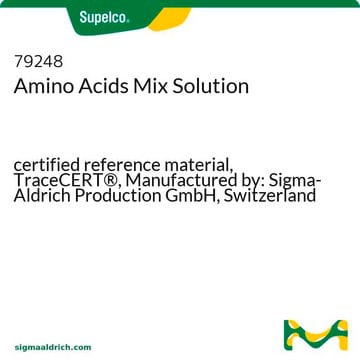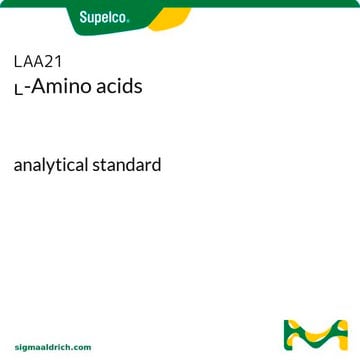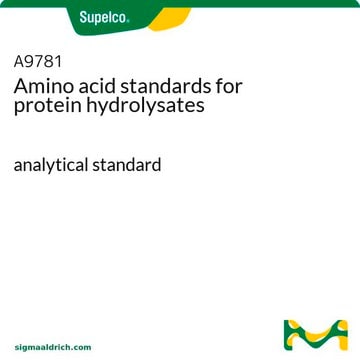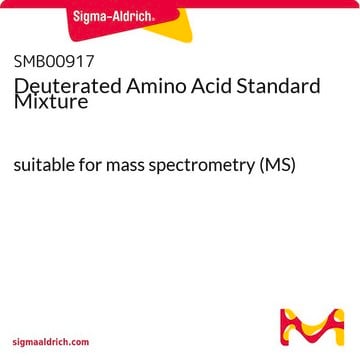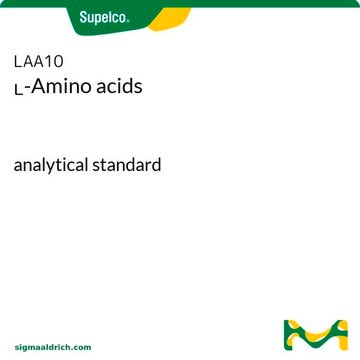Recommended Products
grade
analytical standard
shelf life
limited shelf life, expiry date on the label
analyte chemical class(es)
amino acids, peptides, proteins
technique(s)
HPLC: suitable
gas chromatography (GC): suitable
application(s)
food and beverages
format
multi-component solution
storage temp.
2-8°C
Related Categories
Application
This analytical standard was used as follows:
- Determination of L- and D-amino acids and glycine by liquid chromatography-tandem mass spectrometry (LC-MS/MS) following their derivatization with chiral Marfey’s reagent
- High-performance liquid chromatography (HPLC) based amino acid analysis during the characterization of defatted rice bran (DRB) protein concentrate to evaluate its iron binding ability
- Development of a gas chromatography-mass spectrometry (GC-MS) procedure for the profiling of 112 amino-carboxylic metabolites in human urine samples using 1,1,1,2,2,3,3-heptafluorobutyl chloroformate for derivatization and liquid-liquid microextraction for sample treatment
- Non-enantiomeric detection and quantification of amino acids in their various forms— free, dissolved, particulate, and total, in natural water samples by HPLC coupled with fluorescence detection using a C18 column
Packaging
1 mL size packaged in flame sealed ampules.
Components
The following components are included in the amino acid standard:
- L-Alanine
- Ammonium chloride
- L-Arginine
- L-Aspartic acid
- L-Cystine
- L-Glutamic acid
- Glycine
- L-Histidine
- L-Isoleucine
- L-Leucine
- L-Lysine
- L-Methionine
- L-Phenylalanine
- L-Proline
- L-Serine
- L-Threonine
- L-Tyrosine
- L-Valine
Other Notes
Amino acids in this standard are 2.5 μmoles per mL in 0.1 N HCl, except L-cystine at 1.25 μmoles per mL.
related product
Product No.
Description
Pricing
Signal Word
Warning
Hazard Statements
Precautionary Statements
Hazard Classifications
Met. Corr. 1
Storage Class Code
8B - Non-combustible corrosive hazardous materials
WGK
nwg
Flash Point(F)
Not applicable
Flash Point(C)
Not applicable
Choose from one of the most recent versions:
Certificates of Analysis (COA)
Lot/Batch Number
Don't see the Right Version?
If you require a particular version, you can look up a specific certificate by the Lot or Batch number.
Already Own This Product?
Find documentation for the products that you have recently purchased in the Document Library.
Customers Also Viewed
Benyamin Khoshnevisan et al.
Bioresource technology, 290, 121743-121743 (2019-07-20)
Resource efficient and novel practices to produce proteinaceous food and feed sources can partially alleviate the protein scarcity problem. The conversion of low-value waste streams into single cell protein (SCP) seems a potent solution. This study evaluated the possibility of
Manish Kumar Patel et al.
BMC plant biology, 20(1), 116-116 (2020-03-17)
Developing fruit is considered as an excellent model to study the complex network of metabolites which are altered rapidly during development. Metabolomics revealed that developing psyllium fruit is a rich source of primary metabolites (ω-3 and ω-6 fatty acids and
Lu Meng et al.
Microbial cell factories, 19(1), 134-134 (2020-06-24)
The Saccharomyces cerevisiae Snf1 complex is a member of the AMP-activated protein kinase family and plays an important role in response to environmental stress. The α catalytic subunit Snf1 regulates the activity of the protein kinase, while the β regulatory
Willian Batista-Silva et al.
Plant, cell & environment, 42(5), 1630-1644 (2019-01-12)
Plant responses to abiotic stress include various modifications in amino acid metabolism. By using a hydroponic culture system, we systematically investigate modification in amino acid profiles and the proteome of Arabidopsis thaliana leaves during initial recovery from low water potential
X Fu et al.
Nature communications, 9(1), 2177-2177 (2018-06-07)
Collective behavior can spontaneously emerge when individuals follow common rules of interaction. However, the behavior of each individual differs due to existing genetic and non-genetic variation within the population. It remains unclear how this individuality is managed to achieve collective
Our team of scientists has experience in all areas of research including Life Science, Material Science, Chemical Synthesis, Chromatography, Analytical and many others.
Contact Technical Service